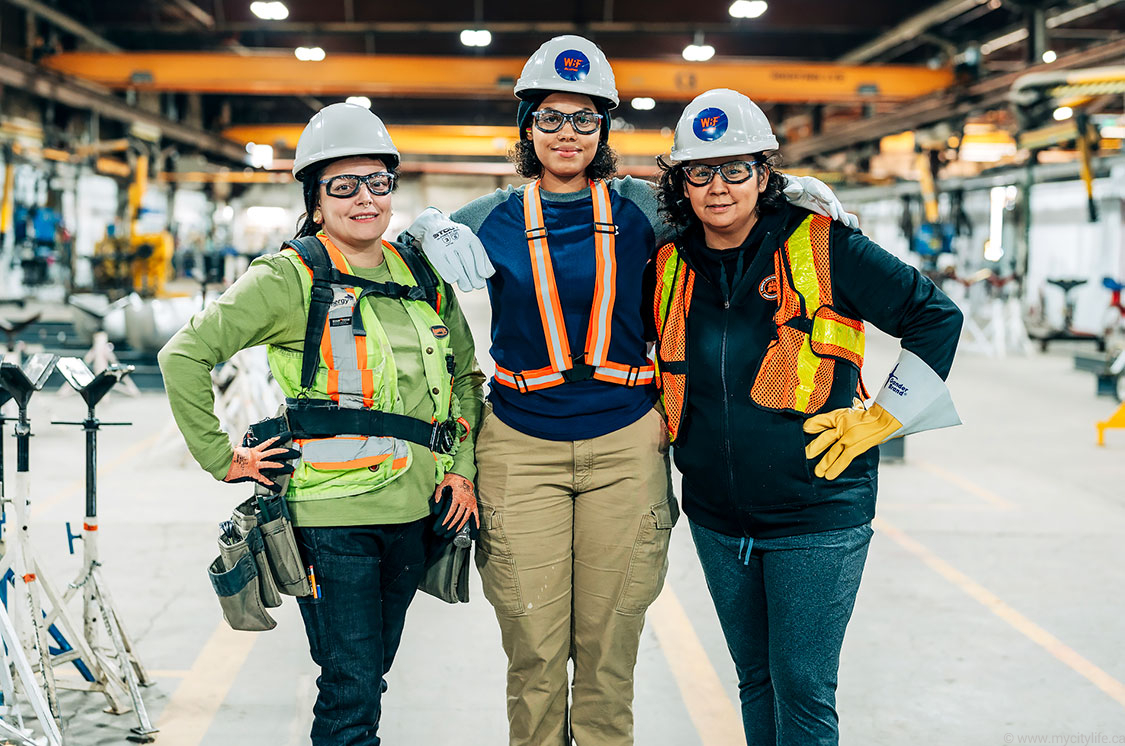Women Building Futures: Connecting Women to Economic Opportunities
Carol Moen’s vision is to empower this generation of women and the next, through the trades.
Carol Moen, President and CEO of Women Building Futures (WBF), leads with a unique blend of engineering acumen and a heartfelt commitment to empowering women. During her tenure at its helm, WBF has not just been a job, but has also become a core part of her identity. “In the four-plus years that I have been in this role, the work that Women Building Futures does has now really become part of who I am,” Moen reflects, underscoring her personal connection to the organization’s mission.
Moen’s journey is one marked by a deep-rooted passion for engineering and an unwavering dedication to women’s advancement in fields where they remain underrepresented. Her career began at Dow Chemical, where she ascended through various roles over 26 years, from engineering to global leadership positions. Following her tenure at Dow, Moen served as the first female registrar for the Association of Professional Engineers and Geoscientists of Alberta (APEGA), where she implemented critical governance and operational frameworks.
Moen retired in 2017, but soon found that it had been premature and had left her feeling somewhat adrift and without purpose. So when WBF came knocking, she saw it as the perfect opportunity, one that not only aligned with her professional values but also resonated personally. “This opportunity with Women Building Futures … really called to me,” Moen shared in a recent interview.
Under Moen’s leadership, WBF has embarked on impressive and impactful expansions, most recently into Ontario and Saskatchewan, bolstered by a recent $2.6 million grant from the Canadian government. The funding is part of a strategic initiative to enhance the economic security of women, particularly those who are unemployed or underemployed — a cause Moen and the organization champions vigorously.
This expansion also serves as the foundation for building sustainable local partnerships in both regions. “The reality of federal funding is that it’s on a time frame, with this grant being for two years,” explains Moen. “While we can use the grant money to enter new provinces, we’re also doing incredible work to begin building industrial and employment partnerships as well as build private-sector funding through donor partnerships. It’s how we set a strong foundation, because of course in order to stay in a region the province has to want us there. We’ve nurtured a wonderful partnership with the government of Alberta over the years, for example, and now they help to provide us with sustainable funding so we can maintain our programs after grant money time is up.”
Moen’s journey to WBF was influenced by her prior experiences as a woman in engineering, a field where women are significantly underrepresented. “I’ve really come to understand that my story as it relates to being a woman [engineer] isn’t the normal story,” she acknowledges, referencing her privilege as a white well- educated woman with a stable home life. This awareness fuels her dedication to making WBF a transformative space for all women, particularly those facing systemic barriers.
The programs at WBF do more than teach skills; they build confidence and community. They also involve preparing industries to integrate and support women effectively. The organization fosters partnerships with employers to cultivate inclusive work environments and champions diversity, equity, and inclusion across the trades. “We recognize the need to eliminate barriers for women, enabling them to safely access effective pathways to economic security,” Moen states. “We often say ‘We spent the last 25 years getting women ready for the trades, and now we’re spending just as much time and effort getting the trades ready for women,’ and that statement is all about workforce inclusion.”
Moen captures the emotional payoff of this work, saying, “The confidence and pride on the faces of the women when they graduate through our programming just refuels me, it’s an amazing thing.” She adds, “In such a short amount of time we’re able to help someone who was often struggling and have them take control of their life and probably never need to be on social supports again. I think that impact is what brings incredible satisfaction to me and for everyone across our organization.”
Carol Moen’s vision for WBF is expansive and deeply integrated into the fabric of the communities it serves. Her leadership not only advances WBF’s mission but also catalyzes a broader movement towards equality and empowerment in the skilled trades, making a profound impact on the lives of countless women. As WBF continues to evolve, Moen’s influence remains a beacon of progressive change, proving that with the right support women can thrive in any field they choose. Moen’s vision for a balanced and equitable workforce is gradually becoming a tangible reality for many women across Canada.
womenbuildingfutures.ca
@wbfintrades
INTERVIEW BY MARC CASTALDO














































































